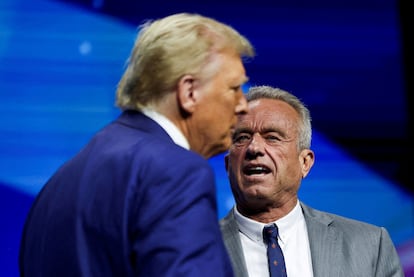More than 75 Nobel laureates urge US Senate not to confirm Robert Kennedy as Secretary of Health
The letter, which was seen by ‘The New York Times,’ stresses that public health would be at risk under his leadership


A group of over 75 Nobel laureates have signed a letter urging the U.S. Senate not to confirm Robert F. Kennedy Jr., president-elect Donald Trump’s pick to lead the Department of Health and Human Services (DHHS), and a known anti-vaxxer. The letter, seen by The New York Times, is the first on record in which a coalition of laureates has joined ranks against a Cabinet pick, according to Richard Roberts, the 1993 Nobel laureate in physiology and medicine who helped draft the letter. The prize-winning club of researchers and academics rarely takes public policy stances, Roberts said, let alone together.
The Nobel laureates’ main argument is that under Kennedy’s leadership, public health would be at risk. Roberts said the confirmation of Kennedy, a staunch critic of conventional medicine but also of Big Pharma, was a threat that the Nobel laureates could not ignore. Kennedy has repeatedly shown himself to be against scientists and the agencies that are overseen by the Department of Health. “These political attacks on science are very damaging. You have to stand up and protect it,” Roberts said.
The laureates question the suitability of the candidate, who they say “lacks credentials” in medicine, science, or administration, to lead the department responsible for protecting public health and funding biomedical research. “Placing Mr. Kennedy in charge of DHHS would put the public’s health in jeopardy and undermine America’s global leadership in the health sciences,” the letter warns.
If confirmed by the Senate, the signatories of the letter warn, Kennedy’s well-known opposition to well-established public health tools such as vaccines and fluoridation of drinking water would pose a risk to the country’s well-being. The letter also denounces Kennedy’s promotion of conspiracy theories, including falsely linking vaccines to autism, his rejection of scientific evidence showing that HIV causes AIDS, and his claim that the coronavirus was “targeted to attack Caucasians and Black people,” and that Chinese and Jews are immune to the virus. Far from apologizing for the controversy caused by his words, during his campaign as a presidential candidate, Kennedy lashed out on the social network X against the media outlet that had published these racist statements. The Kennedys, and especially his sister Kerry, have publicly disowned him, considering that he tarnishes the legendary family name.
Kennedy has threatened to fire employees of the Food and Drug Administration (FDA), which he says has waged a “war on public health,” and has promised to replace hundreds of employees of the NIH, the acronym for the National Institutes of Health, one of the most advanced centers in the world for medical research, the day after Trump is inaugurated on January 20. According to the nominee, a former Democrat converted to the Trumpist religion — he abandoned the traditional family party from which he launched his candidacy to run for the White House as an independent and then dropped out to support the Republican candidate — immunologists should “be locked up in jail and the key thrown away.” The FDA and the NIH are two of the main agencies of the Department of Health.
If he passes the Senate test, Kennedy will lead a department made up of 13 federal agencies with a total of 80,000 employees that is responsible not only for the country’s health policy but also for drug and food regulation, as well as the main public health insurance programs, Medicare and Medicaid. His nomination was greeted with stupor by the scientific community, some of whom recalled his role in one of the worst measles outbreaks in recent times, when he flooded Samoa with misinformation, causing the vaccination rate to fall to a dangerously low level in 2018. The following year, when a traveler brought measles to the islands, the disease ravaged the population, infecting more than 5,700 people and killing 83, most of them young children.
Sign up for our weekly newsletter to get more English-language news coverage from EL PAÍS USA Edition
Tu suscripción se está usando en otro dispositivo
¿Quieres añadir otro usuario a tu suscripción?
Si continúas leyendo en este dispositivo, no se podrá leer en el otro.
FlechaTu suscripción se está usando en otro dispositivo y solo puedes acceder a EL PAÍS desde un dispositivo a la vez.
Si quieres compartir tu cuenta, cambia tu suscripción a la modalidad Premium, así podrás añadir otro usuario. Cada uno accederá con su propia cuenta de email, lo que os permitirá personalizar vuestra experiencia en EL PAÍS.
¿Tienes una suscripción de empresa? Accede aquí para contratar más cuentas.
En el caso de no saber quién está usando tu cuenta, te recomendamos cambiar tu contraseña aquí.
Si decides continuar compartiendo tu cuenta, este mensaje se mostrará en tu dispositivo y en el de la otra persona que está usando tu cuenta de forma indefinida, afectando a tu experiencia de lectura. Puedes consultar aquí los términos y condiciones de la suscripción digital.








































